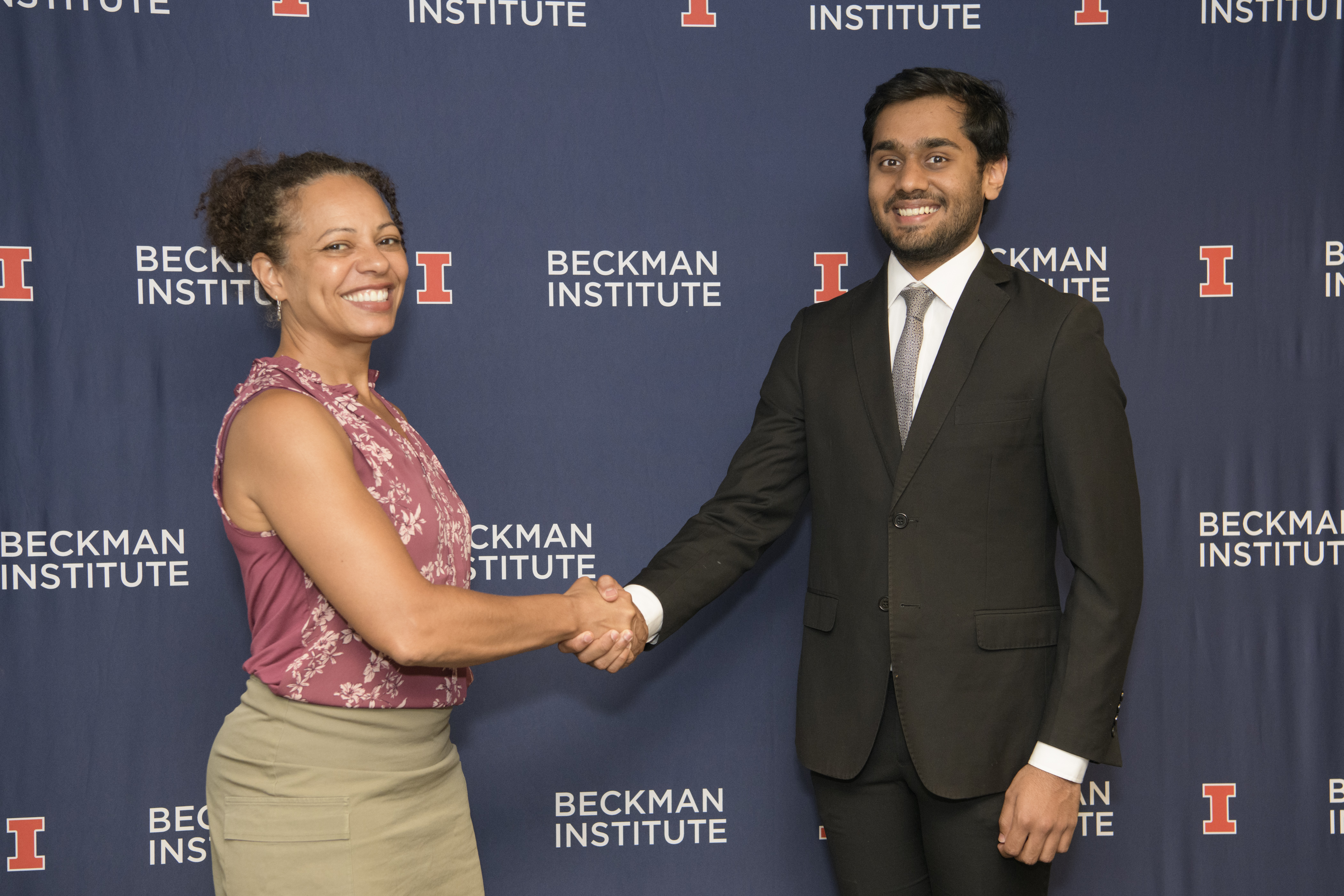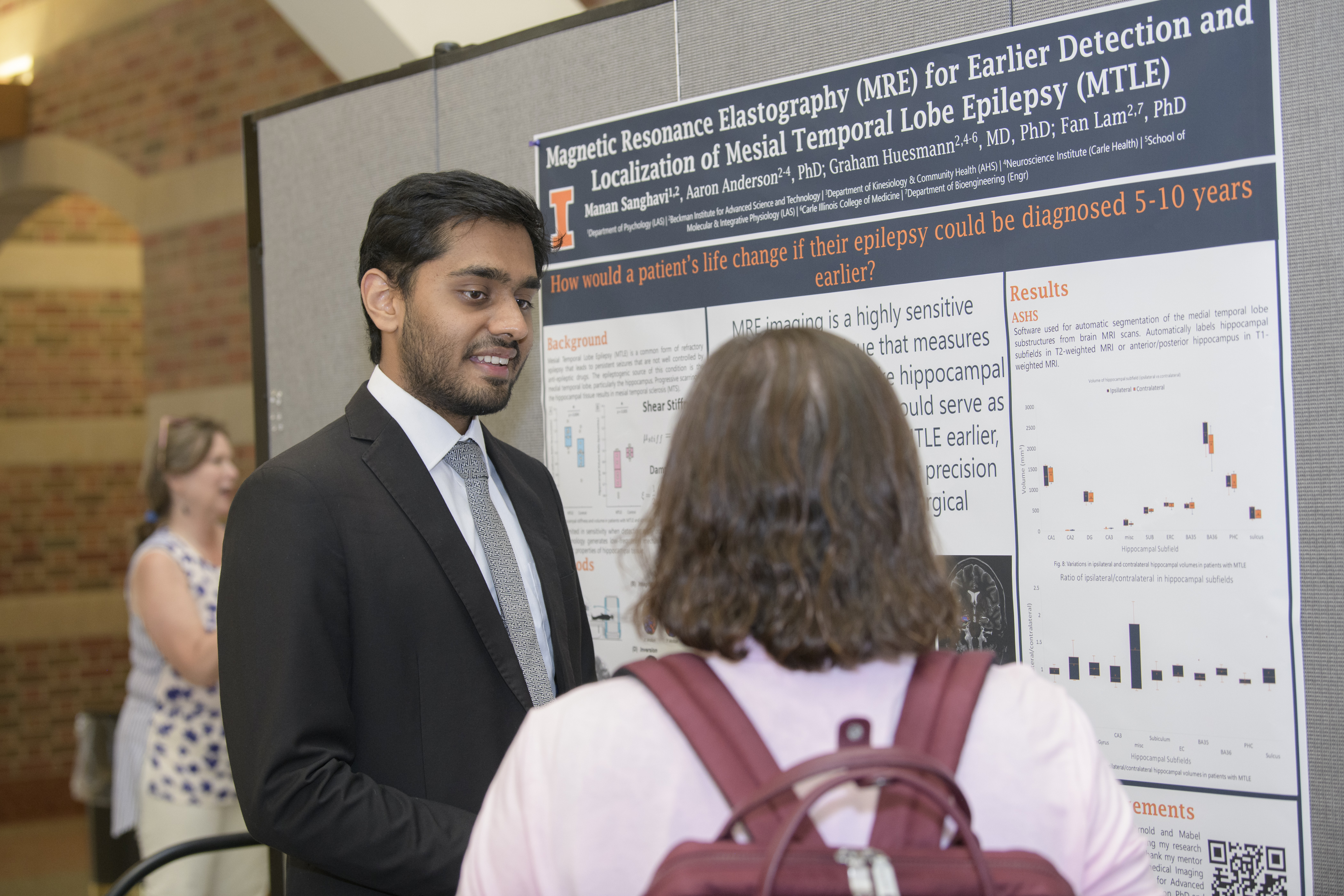 Former Beckman Director Nadya Mason, left, and Manan Sanghavi shake hands at the 2023 Beckman Institute Fellowships and Awards ceremony.
Former Beckman Director Nadya Mason, left, and Manan Sanghavi shake hands at the 2023 Beckman Institute Fellowships and Awards ceremony.
I'm Manan Sanghavi, a final-semester undergraduate student majoring in brain and cognitive science at the University of Illinois Urbana-Champaign. At the Beckman Institute for Advanced Science and Technology, I collaborate with Aaron Anderson in the Biomedical Imaging Center.
As a curious student, I have always been interested in the intricacies of scientific research, especially promising clinical and translational research that could change the way we treat and diagnose patients. But presenting your research can be intense and overwhelming, especially if you don’t know where to begin.
In the spring 2023 semester, I was privileged to have been an awardee of the Beckman Institute Undergraduate Fellows Program. I conducted eight weeks of research over the summer and had the opportunity to present a poster at the Beckman Institute.
Here’s what I learned from my experience.
1. Know your audience.
Most of the people you're presenting to will be curious, but not all of them will understand your research in the same way you do. In fact, some people (like faculty members, experts, and other professionals in the field) may understand your research more than you! Learn from them. For those who don't understand your research as well, talk to them as if you’re sharing an idea. Make your talk concise but detailed enough to not leave out important pieces of the story. Be prepared to fill others in if they join midway through presenting.
2. Provide context.
In simple terms, why does your research matter? The human brain makes connections, and that’s how your audience will learn and retain the most information. By providing background knowledge, you are supporting their experience of learning your research and engaging in meaningful conversation. Slowly ease your audience into the depth of your research. Ask them if they're following you. Even if you have significant findings and are part of cutting-edge research, none of it matters if you can’t communicate effectively.
3. Be truthful.
When communicating vital information, we are vulnerable to biases, inaccuracies, and false conclusions. In trying to communicate clearly, we may even fall into the trap of interpreting numbers and statistics to create a narrow, unidimensional perspective. When explaining our posters, it is important that we convey our exciting scientific discoveries and stories precisely. For example, you might create an eye-catching headline or title — which is a great strategy, as long as it’s accurate! While the science we do is exciting and novel, we must have integrity; that means being trustworthy, transparent, and thorough.
4. Invite questions.
 Sanghavi presents his research at the 2023 Beckman Institute Fellowships and Awards ceremony.People see symposiums as a place to present their research. An underrated perspective is that these events can also kickstart future opportunities. Take every opportunity to engage in conversation that may help you approach your work differently in the future. Treat audience members’ questions as pathways to your future answers. If you don’t know something, admit it! That’s OK. This interaction isn’t about expertise, it’s about sharing what you learned and how you can proceed in the future.
Sanghavi presents his research at the 2023 Beckman Institute Fellowships and Awards ceremony.People see symposiums as a place to present their research. An underrated perspective is that these events can also kickstart future opportunities. Take every opportunity to engage in conversation that may help you approach your work differently in the future. Treat audience members’ questions as pathways to your future answers. If you don’t know something, admit it! That’s OK. This interaction isn’t about expertise, it’s about sharing what you learned and how you can proceed in the future.
5. Welcome criticism.
There’s often a feeling of impending doom when it comes to messing up during a presentation. For some, it’s the delivery that feels stressful, for which I recommend rehearsing just enough to be able to narrate key points of your research story. For others, the stressful part has to do with potential criticism from mentors and peers. I’ve learned that a good scientist isn’t someone who doesn't make mistakes; a good scientist is curious enough to understand the anatomy of a mistake, the complex impact mistakes have on research, and the role that certain errors play in understanding science. Great scientists leverage their mistakes to find subtleties in nature other people may not find. Being a keen observer and a curious thinker will always be more important than being a perfect learner. You’re not alone in the journey of understanding science, so don’t let criticism hurt you. Let it help you.
In conclusion ...
To my fellow student scientists getting ready for a presentation: look around and make the most of this moment! Your mentors have contributed to your academic and professional growth and have inspired you to think differently; make sure you thank them! Being witness to so many promising ideas is a privilege, so be sure to talk to others before or after your allotted presentation time. I learned so much from talking to other people about their posters and this was my favorite part of presenting a poster at an event.
I’d like to thank the Arnold and Mabel Beckman Foundation, the Beckman Institute, and Aaron Anderson for the opportunity to experience the process of scientific enquiry closely and practice my curiosity. I hope my learnings help you experience science differently.
Don’t be afraid. Stay curious!
Manan Sanghavi